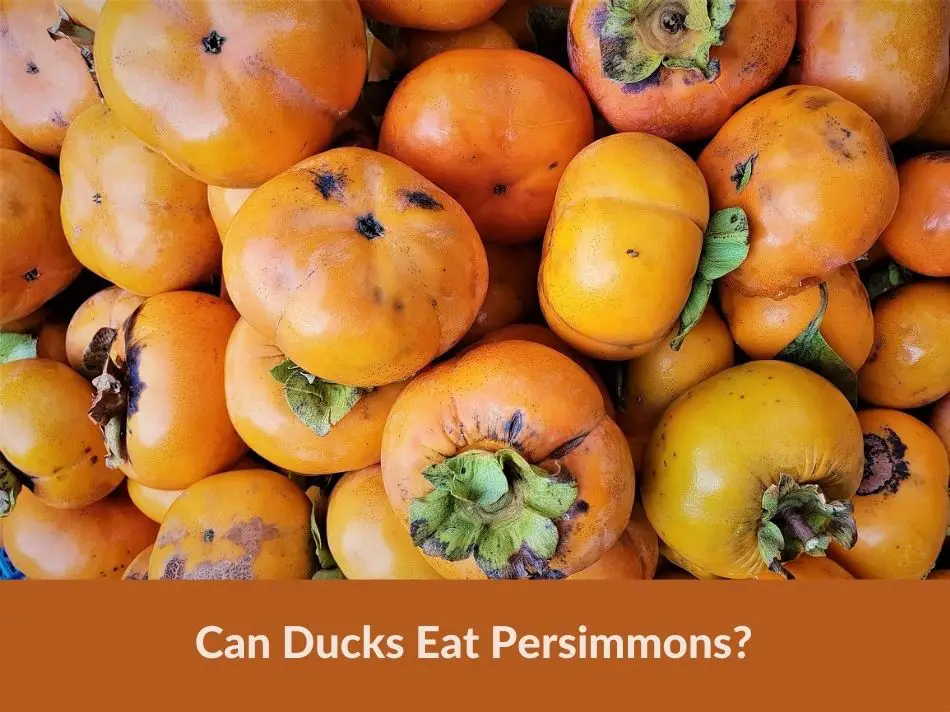Ducks are omnivorous creatures with a varied diet that largely depends on their habitat. They can eat a wide range of foods from small fish, insects, and snails to grass, aquatic plants, and seeds. But, can ducks eat persimmons?
Yes, ducks can eat persimmons. Persimmons are fruits that are rich in nutrients and can be a tasty treat for ducks. They contain vitamins and minerals that are beneficial for a duck’s health. Like many fruits, they also have natural sugars which provide a quick source of energy.
In this article, we delve into the dietary habits of ducks, specifically concerning the feeding of persimmons. We’ll discover if persimmons are safe for ducks, how often they can be given this fruit, and whether or not ducklings can consume them.
How Often Can I Feed My Ducks Persimmons?
While persimmons are safe for ducks, they should be treated as an occasional treat rather than a staple diet. Since ducks require a balanced diet to stay healthy, feeding them too much of any one food, including persimmons, could upset this balance.
Offering persimmons once or twice a week in moderation is more than enough. When feeding treats like persimmons, caretakers and park visitors should always make sure the quantity given is proportionate to the number of ducks and doesn’t replace their regular meals.
Can Ducklings Eat Persimmons?
When it comes to ducklings, their dietary requirements are different from adult ducks. During the early stages of their life, they primarily require protein-rich foods for growth. While persimmons are not harmful to ducklings, they are not particularly beneficial either. It’s best to prioritize foods that cater to their developmental needs.
If one still wishes to introduce persimmons to ducklings, it should be done in tiny amounts and occasionally. The fruit should be finely mashed or chopped to make it easier for the ducklings to eat. Always observe ducklings after introducing a new food to check for any adverse reactions.
Are Persimmons Healthy For Ducks?
Persimmons are not just delectable fruits for humans; they also bring a mix of nutritional benefits that can be advantageous for ducks. Let’s explore the key nutrients that persimmons offer and their potential benefits for our feathered friends.
- Vitamins and Minerals: Persimmons are notably rich in Vitamin A, Vitamin C, and Vitamin E. Vitamin A is crucial for the maintenance of good vision and overall cellular health. Vitamin C, an antioxidant, plays a role in collagen synthesis, aiding in the maintenance of skin, cartilage, and bones. Vitamin E also functions as an antioxidant, helping to protect the body against free radicals. Additionally, persimmons contain vital minerals like potassium, manganese, and copper. Potassium helps with maintaining proper muscle function, while manganese and copper play roles in bone health and enzymatic reactions, respectively.
- Fiber: Persimmons contain dietary fiber, which aids in digestion. A small amount of fiber can help ducks with digestion and bowel regularity. It can also provide a feeling of fullness, which can be helpful in controlled feeding scenarios.
- Natural Sugars: The sweetness in persimmons comes from their natural sugars, which can serve as a quick energy source for ducks. These sugars, while beneficial in small amounts, should not be overconsumed, as an excessive intake might lead to unhealthy weight gain.
- Antioxidants: Beyond the vitamins mentioned, persimmons are a source of powerful antioxidants like flavonoids and tannins. Antioxidants play a role in combating oxidative stress in the body, which can otherwise lead to cellular damage.
- Water Content: The high water content in persimmons can be beneficial for hydration. Ducks, like all birds, require adequate hydration, and while their primary source should always be clean water, the water from food can also contribute.
How To Feed Persimmons To Ducks
- Choose Ripe Persimmons: Always select ripe persimmons for feeding. Unripe persimmons can be astringent and might not be palatable for ducks. Ripe persimmons have a soft texture and a sweet flavor.
- Wash Thoroughly: Before feeding, wash the persimmons under running water to remove any dirt, pesticides, or other contaminants.
- Remove Seeds: Cut the persimmon open and take out any seeds. Seeds can pose a choking hazard or be hard for ducks to digest.
- Cut into Small Pieces: Chop the persimmons into bite-sized pieces, making it easier for the ducks to consume and reducing the risk of choking.
- Feed in Moderation: Don’t overfeed. A few pieces per duck is more than enough. Remember, treats should supplement their primary diet and not replace it.
- Avoid Mixing with Other Foods: It’s best to feed persimmons separately rather than mixing them with other foods. This allows the ducks to enjoy the fruit fully and can make monitoring their intake easier.
- Provide Fresh Water: Always have a source of clean, fresh water available when feeding ducks, allowing them to wash down the food and aiding in digestion.
More Fruits Ducks Can Eat
Ducks have quite a diverse palate when it comes to fruits. Not only can they enjoy the succulent taste of persimmons, but a variety of other fruits can also be included in their diet for both pleasure and nutritional benefits.
Here are five more fruits that ducks can safely eat:
Don’t forget to take a look at our detailed list of fruits that are safe for ducks.
Conclusion
While persimmons do provide an array of nutrients, it’s essential to remember that a duck’s primary diet consists of a balance of proteins, grains, and greens. Treats like persimmons can supplement this primary diet and offer variety, but they shouldn’t become a primary food source.
It’s the combination of varied nutrients from multiple food sources that contribute to a duck’s overall health and well-being.
Disclaimer: The information in this article is for informational purposes only. I'm not an expert or a veterinarian.


